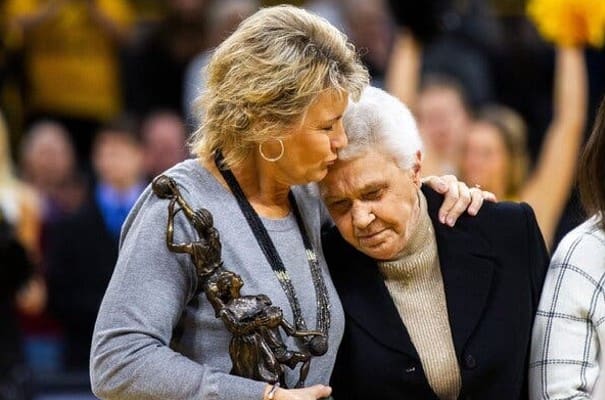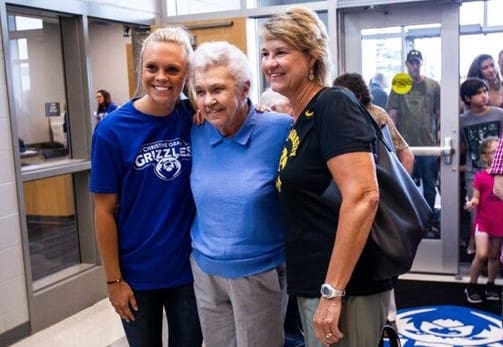Christine Grant, center, with Lisa Bluder, right, coach of Iowa women’s basketball, and Jaime Printy Brandt, a former Iowa player and teacher
at an elementary school named for Grant in North Liberty, Iowa. Credit…Joseph Cress/Iowa City Press-Citizen /USA TODAY NETWORK
Recently on January 6, 2022, the NY Times published an article honoring the recently deceased Christine Grant, the University of Iowa’s first women’s athletic director and a pioneer who helped shape the 1972 Title IX legislation, tirelessly advocating for the fair treatment of women in sports.
It’s easy to gloss over how tough it was for trailblazing women like Christine Grant to make a difference in what had been (and too often, still is), a man’s world. Without a doubt, it’s due to their lifelong resolve and refusal to accept sub-standard treatment that women’s sports are where they are today, and where they are going tomorrow. And yet, we’re so far from where we need to be.
My favorite quote from Grant in the article:
“We cannot continue as a nation to continue discarding the dreams and the talents of half of our population.”
Even after all she accomplished in her lifetime to achieve equality for female athletes, Grant acknowledged months before her death that women had come a long way but continued to face ongoing discrimination, which was “most recently and visibly evident in the inequitable treatment of female basketball players during the 2021 N.C.A.A. tournament.”
Yes we’ve come a long way, baby, but we’ve still got so far to go. With more women like Christine Grant, I feel sure one day, hopefully sooner rather than later, we’ll get there.
Here’s the NYT article in its entirety:
She Spent Her Life Fighting for Equity for Women in Sports
Christine Grant, the Title IX pioneer who died in December, often lamented
the historically poor treatment of female athletes, asking incredulously,
“Can you imagine that?”
By Jeré Longman
After surviving World War II as a girl in Scotland, sometimes zipped into a one-piece garment called a siren suit and hastened into a bomb shelter built by her father, Christine Grant took up sports. From that point, she often said, she could not imagine her life without them.
She made her mark as a pioneering advocate for women’s sporting opportunity nationwide as an athletic director at the University of Iowa. Grant died in hospice care on Dec. 31, at age 85, on the cusp of the 50th anniversary of the landmark gender-equity legislation known as Title IX. She helped shape the law and called it, apart from the 19th Amendment guaranteeing women the right to vote, “the most important piece of federal legislation that was passed in the 20th century for women in this nation.”
Iowa did not state a cause of death, but colleagues said that Grant had experienced chronic breathing difficulties.
Of all the passionate and persuasive trailblazers who sought respect and opportunity for women in sports, “I think Christine was the most influential,” said Charlotte West, another prominent activist of the Title IX era. “She was extremely intelligent and her Scottish brogue won over a lot of hearts. She was very gentle but extremely forceful.”
In 1972, Title IX was signed into law by President Richard Nixon at a time of more bipartisan comity in the nation’s politics. The law, ambiguously written, forbade discrimination based on sex in any educational program or activity receiving federal funding but did not specifically mention athletics.
After its passage, colleagues said, Grant helped to write guidelines that applied the law to education and sports, served as a consultant to a federal civil rights Title IX task force, testified before Congress and appeared as an expert witness in more than a dozen legal cases involving Title IX and gender equity.
Amy Wilson, the N.C.A.A.’s managing director of inclusion and a former doctoral student of Grant’s, called her “the North Star” of women’s sporting advocacy who prevailed with conviction, a persistent approach based on data and a spellbinding speaking style. She was known to lay out decades of disparate treatment of female athletes, pause masterfully and say, “Can you imagine that?”
Female sports participation at the high school (294,015 in 1971-72 to 3,402,733 currently) and N.C.A.A. (30,000 to 215,486) levels has vastly increased with Title IX. Grant acknowledged that women had come a long way, but continued to express frustration months before her death about ongoing discrimination, which was most recently and visibly evident in the inequitable treatment of female basketball players during the 2021 N.C.A.A. tournament.
 A cutout of Grant was placed in the bottom row of the stands at a women’s basketball game between Iowa and Michigan
A cutout of Grant was placed in the bottom row of the stands at a women’s basketball game between Iowa and Michigan
last year in Iowa City. Credit…Joseph Cress/Iowa City Press-Citizen / USA Today Network
“I would characterize her as just short of heartbroken that she wasn’t able to do more and that there wasn’t more progress,” said Melissa Isaacson, a lecturer at the Medill School of Journalism at Northwestern University and a longtime Chicago sportswriter who interviewed Grant in 2020 for an as-yet-unfinished documentary.
As Grant’s health deteriorated in recent years, the participation of transgender athletes became a flash point at the high school, college and Olympic levels, with officials seeking to balance inclusion and competitive fairness. Grant’s mantra was “whatever’s best for student-athletes overall,” Wilson of the N.C.A.A. said, “but we’re not aware of any position she took on this matter.”
At age 11, Grant began playing netball, a rough equivalent of basketball without backboards, in Scotland. Later, she helped form a national governing body for female field hockey players in Canada. In 1968, she arrived at Iowa, where she obtained a Ph.D. in sports administration. She also discovered unexpectedly and disappointedly that athletic opportunities for female athletes in the United States felt as claustrophobic as the underground shelter in which she had endured World War II.
In 1969, in a story Grant frequently recalled, a field house on Iowa’s campus was to be built with fees paid by male and female students. But architectural plans excluded locker rooms and bathrooms for women, who were not to be allowed into the building. She said she was told that women lacked interest in sports.
“And I’m sure that was the trigger that made me a feminist,” Grant told Ellyn Bartges in 2009 in an interview for the Oral History Project at the Abraham Lincoln Presidential Library. “I mean, I just — that blew me away.”
Grant laughed and continued: “I’m thinking, ‘The greatest democracy in the world, that’s what the U.S. always claims to be. Well, it’s only for a minority of the population because women are the majority here.’ So that was the start of a real understanding of how this world works.”
She had intended to return to Canada but, instead, remained in Iowa and set out to change these disparities over more than three decades as an administrator and professor. In 1973, a forward-thinking male university president, Willard L. Boyd, known as Sandy, named Grant as the athletic director of women’s sports at Iowa at a salary of $14,000, making her one of the first women in the country to hold the title.
She held the job until 2000, marshaling a dozen sports that won 27 Big Ten Conference championships, then taught courses until 2006. According to The Athletic, Grant grew the women’s sports budget from $3,000 to nearly $7 million. And in her unflagging pursuit of equality for women, she was not allergic to showmanship and mischief.
During the 1984-85 basketball season, Grant and university coaches and athletic officials decided to try to set the N.C.A.A. record for attendance at a women’s game. On Feb. 3, 1985, a Sunday afternoon, they succeeded when 22,157 spectators crammed into Iowa’s Carver-Hawkeye Arena, which was designed for a capacity of about 15,500.
As traffic backed up for several miles, Grant took to local radio asking that drivers turn around. After the 56-47 defeat to Ohio State, she received a letter of reprimand for violating the fire code. She framed the letter and hung it in her office, elated at the delicious irony that someone was finally complaining about too many fans attending a women’s basketball game.
Vivian Stringer, Iowa’s coach at the time, has said that tears rolled down her cheeks when she saw the size of the crowd. On Tuesday, Stringer wrote in a eulogyof Grant’s devotion to gender and racial equity, including paying Stringer a salary equal to the Iowa men’s coach. “If there was a Mount Rushmore of impactful female pioneers in sports, Christine would be on it,” wrote Stringer, now the longtime coach at Rutgers.
Yet there have been many roadblocks to equality, some petty, others grievous.
Grant told of how, upon being named the women’s athletic director at Iowa, she was asked to step out of the group photo of her male counterparts at Big Ten meetings. And how in 1981, when the once-dismissive N.C.A.A. voted at its convention to sponsor women’s championships, essentially killing the Association of Intercollegiate Athletics for Women, of which Grant had been president, her resistance was met with some boos and nasty caricatures drawn on pieces of paper.
 Fame in 2018. Credit…Joseph Cress/Iowa City Press-Citizen / USA Today Network
Fame in 2018. Credit…Joseph Cress/Iowa City Press-Citizen / USA Today Network
Last March in an interview with The New York Times, Grant noted the continuing lack of administrative power for women in the N.C.A.A. and wondered yet again whether it had been the right move for women’s sports to join the organization. “If your values are money, going with the N.C.A.A. is probably a wise choice,” she said. “If it’s more than money, you might want to rethink that decision.”
In 2017, when Iowa lost a sex discrimination case involving a former female coach and a senior athletic official, a retired Grant lamented to The Des Moines Register, “I mean, where are our athletic directors? Where are our presidents? We cannot continue as a nation to continue discarding the dreams and the talents of half of our population.”
Around that time, recalled Lisa Bluder, Iowa’s longtime women’s basketball coach, she and an assistant were having lunch with Grant when Grant decided to give an impromptu lesson on equality. She led the coaches from the restaurant to her home to view her latest presentation on gender equity, telling them, “We are still not there.”
Years before, hesitant to seek a raise, Bluder said she asked the retired Grant whether the request would be appropriate. The response, Bluder said, impersonating Grant’s Scottish accent, was “Lisa, you’re not fighting for yourself, you’re fighting for your daughters and all the women that come behind you.”
Her status as an outsider born elsewhere and her unwavering pursuit of the American ideal of equality in sports and beyond, even amid her frustration, seemed to lend gravity and legitimacy to Grant’s advocacy, Bluder said.
“That disbelief she could have in her voice,” Bluder said, “made it more real for everybody.”
From Observation to Innovation,

Andi Simon, Ph.D.
Corporate Anthropologist | Author | CEO Simon Associates Management Consultants
Andisimon.com
Info@simonassociates.net
@simonandi
LinkedIn



